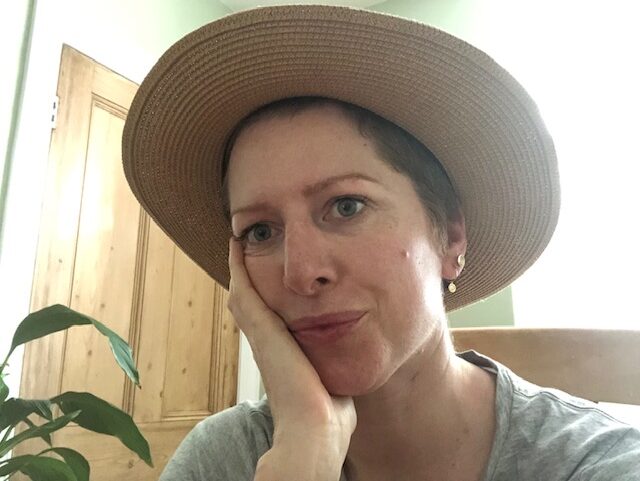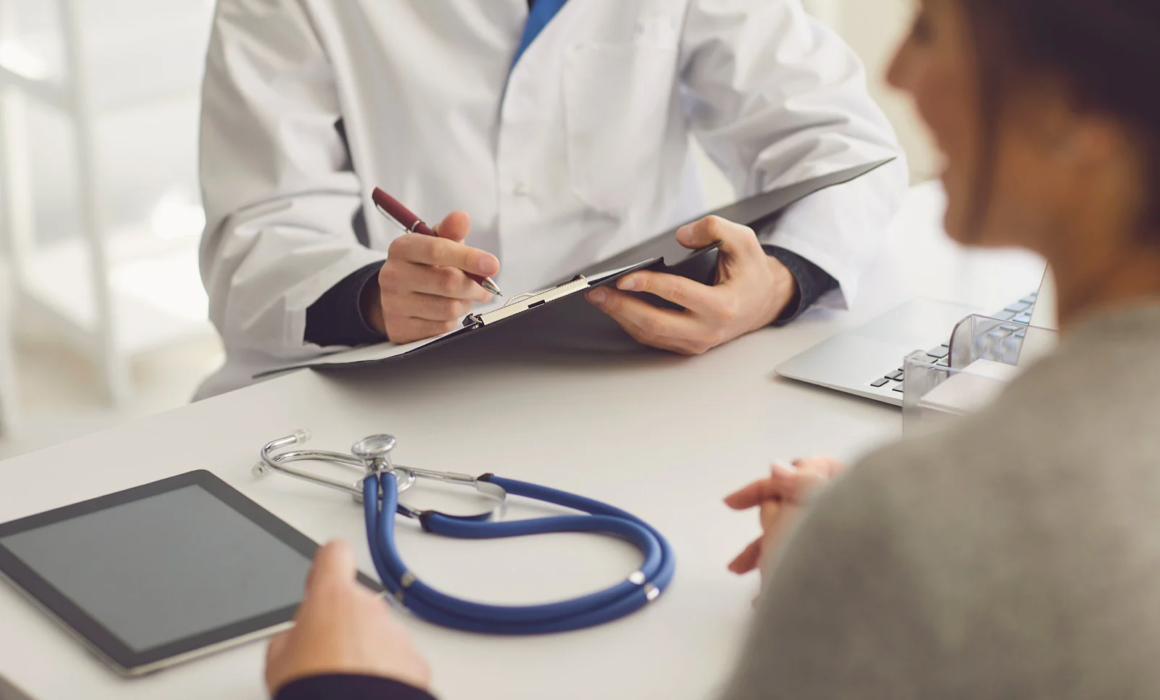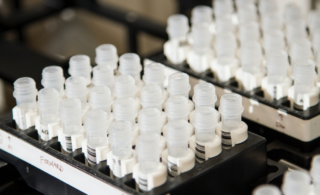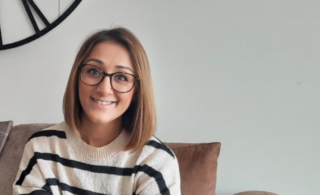
Laura was diagnosed with primary breast cancer in 2021 and in this article she talks about her experience and shares her top tips for going through treatment.
By Laura
Diagnosis
After noticing my nipple pulling in, and following several scans and biopsies, on July 2021 I was diagnosed with grade 3 ER/PR+ invasive ductal carcinoma at the age of 42. I didn’t cry, I was completely numb and went into practical mode: right, what’s the plan?
The hardest part of diagnosis was waiting for results, and then telling my two children aged 10 and 12. I felt so angry that this was going to impact their lives, then utterly terrified that I might not be around for them.
Note: My diagnosis changed mid-way through my treatment to a mixed multi-focal breast cancer. They discovered after surgery that I also had grade 2 invasive lobular cancer, which had alluded scans and biopsies. Two breast cancers. Not a fun surprise.
Top tip: Due to covid restrictions, I attended a lot of appointments alone. If you have to go alone, record appointments (with permission) on your phone. Also, be prepared for things to change as they learn more about your cancer.
Chemotherapy
I had one slightly enlarged lymph node at diagnosis which was biopsied and came back positive for ductal cancer. Within two weeks of diagnosis, I started five months of chemotherapy. I had three rounds of EC, and three rounds of docetaxel every three weeks.
I wish I could tell you I coped OK. I wish I could tell you that it wasn’t as bad as I thought; I simply can’t. It was a very dark time, but something my husband said to me at the beginning helped me so much, “It doesn’t have to be pretty Laura, you just have to show up”.
And it wasn’t pretty. I didn’t fancy dress or TikTok my way through chemo (but thank you to the beautiful humans that have the strength to do so). Every three weeks, I just ‘showed up’. It was the best I could do.
Top tip: Don’t stop living. I shut myself away and put my life on hold during chemo. It made the isolation of treatment so much worse. On your good days make plans! And don’t forget, no matter how bad you feel, it will pass.
Surgery
Due to the size of my tumour, I opted for a mastectomy. I requested they take both breasts but was shut down by my surgeon immediately – it wasn’t even an option for me. I found that really, really difficult. I didn’t want reconstruction, and I also did not want to live with one breast. I wanted to live flat. Everything is so out of your control when you have cancer, I naively presumed I could at least make a decision about my body and have my wishes heard.
On Christmas Eve, Santa popped down the chimney and made off with my left boob and four lymph nodes. Merry Christmas! I was so happy to be home later that night so I could spend Christmas day with my family. I was a little sore, and the drains were uncomfortable, but I recovered well. It was a long 10 days waiting for the pathology results, but I was feeling optimistic. After all, chemo was so horrific, it must have worked.
Results
Results were in! My original ductal tumour had shrunk considerably, and there was no sign of it in the four lymph nodes removed. Yay. However, when a surgeon pauses and then tells you they found something unexpected – you can be darn sure it’s not something you actually want them to find like that necklace you lost over a year ago. Nope, it was 5cm of lobular cancer which had also crept into my lymph nodes. Who knew you could have two breast cancers at once? I needed more surgery to remove the rest of my nodes. Happy New Year!
More surgery
Due to NHS waiting lists, it was almost five weeks before I could have the rest of my lymph nodes removed. Every day felt like more time for any rogue cancer cells to spread and I was beyond relieved to get to my next surgery day covid free (not an easy task with two children at school). Pathology came back with more lobular cancer, so the clearance was worth it. However, recovery after a total axillary clearance was much tougher. My range of movement was significantly reduced, and I developed thick, restrictive cording. Despite having weekly physio, I am still having issues nearly five months later.
Top tip: Advocate for what you want, and advocate for an equitable level of care. I know of ladies in other hospital trusts who were granted their wish for an elective double mastectomy. It should not be a postcode lottery! I wish I had pushed harder.
Radiotherapy
Five weeks after surgery, I began 15 sessions of radiotherapy to my left chest wall and super clavicular (fancy term for collarbone). For me, physically this was by the far the easiest part of my treatment. It was tiring going to the hospital every day, but after your initial planning consultation, the appointments were really quick. I am so pale I’m almost see-through, so I was convinced my skin would blister and break out. But apart from some mild sun burn and fatigue, I had no issues at all.
Top tip: Radiotherapy is tiring. Hydrate, hydrate, hydrate! And rest. Don’t’ forget you are still in active treatment.
Finish line – or is it?
As both my cancers were very hormone receptor positive, to reduce my risk of recurrence I started a combination of tablets and injections to put me into a medical menopause – no yummy oestrogen for me for the next ten years. I do suffer with side effects from this treatment, mostly very achy joints, and hot flushes. But so far, it’s all manageable.
Six weeks after radiotherapy I was set free; into the wilderness you go Laura. After being completely institutionalised for the past nine months, I am now responsible for keeping an eye on any changes or new symptoms – fingers and toes firmly crossed.
It was at this point I found myself surrounded by a welcome yet uncomfortable stillness. Firmly sat in the devastation of the blast zone, I ask myself: what the fudge just happened?
Top tip: Ask for help. Contact your local cancer support charity for any moving on courses or counselling that will help you process your cancer experience.

To return to the homepage of our Information Hub, click here where you can access more helpful information, practical advice, personal stories and more.
Future Dreams hold a range of support groups, classes, workshops and events to help you and your carers during your breast cancer diagnosis. These are held both online and in person at the London-based Future Dreams House. To see what’s on offer and to book your place, see here.
September 2022
This article was written by a guest author based on their own experience of breast cancer and its treatment. It is important to note that this is one person’s experience and that whilst there may be commonalities between the experiences of different people, everyone has a different diagnosis/treatment plan/general experience. The information and content provided in all guest articles is intended for information and educational purposes only and is not intended to substitute for professional medical advice. It is important that all personalised care decisions should be made by your medical team. Please contact your medical team for advice on anything covered in this article and/or in relation to your personal situation. Please note that unless otherwise stated, Future Dreams has no affiliation to the guest author of this article and he/she/they have not been paid to write this article. There may be alternative options/products/information available which we encourage you to research when making decisions about treatment and support.
Share

Support awareness research
Donate to those touched by BREAST cancer
Sylvie and Danielle began Future Dreams with just £100 in 2008. They believed nobody should face breast cancer alone. Their legacy lives on in Future Dreams House. We couldn’t continue to fund support services for those touched by breast cancer, raise awareness of breast cancer and promote early diagnosis and advance research into secondary breast cancer without your help. Please consider partnering with us or making a donation.



